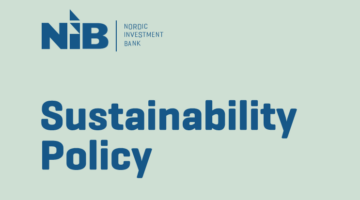The public consultation has ended
NIB’s Board of Directors approved the reviewed Sustainability Policy for public consultation on 4 June 2024. The consultation process was open for 30 days. We invited our stakeholders to provide comments on the document by 8 EEST on 4 July 2024. The policy entered into force on 5 July 2024.
Sustainability Policy renewal process
First approval
NIB's Board of Directors approve a version of the Sustainability Policy for public consultation.
Public consultation
NIB invites stakeholders to comment on the updated document. After 30 days have passed, an internal NIB discussion considers the received contributions, and possibly make an amended version of the Sustainability Policy for a separate Board of Directors approval. If, after the public consultation period, there are no changes to the policy, it shall be deemed approved.
Possible second approval
NIB's Board of Directors is informed about the outcome of public consultation. In case adjustments have been made to the document, the Board has to approve the amended Sustainability Policy.
Entry into force
NIB's launches its updated Sustainability Policy. The Bank publishes the contributions received after the consultation period (if the author's consent is given) and NIB's response to the consultation, explaining the outcome of the process.
We appreciate all the contributions received during the public consultation. NIB has responded to all the contributors personally. Below please see the summaries of contributions for which the consent to publish was given and NIB’s responses to them, respectively.
Thank you for taking the time to consider and provide comments on NIB’s revised Sustainability Policy. It is correctly pointed out that both the Nordic Investment Bank (NIB) and the Arctic Economic Council (AEC) share a commitment to positive socioeconomic development in our Nordic region, including the Arctic.
NIB’s Sustainability Policy defines our approach to sustainability across all operations and the many sectors in which we operate. This policy highlights our commitments and safeguards that we apply when financing eligible projects. As mentioned in the comment, the Arctic has significant potentials, needs, and vulnerabilities that must be addressed. The NIB maintains a similar focus on the Baltic Sea region.
Business opportunities are not explicitly defined in our Sustainability Policy but are detailed in our Mandate Rating Framework. This framework outlines how we assess and rate potential financing opportunities across different sectors. Here, one will for example find renewable energy projects such as wind farms and hydro plants, mining for critical raw materials, and other projects of interest aligned with NIB’s mandate. The framework also includes sectors like innovation, education and healthcare, to mention some.
NIB has a dual mandate of environmental benefit and productivity improvement, as well as economic development. We believe our Sustainability Policy, Mandate Rating Framework and associated documents cover most of the items raised.
While acknowledging the economic contribution of the oil and gas industry to the Nordic region in the medium term, the urgency of the climate challenge necessitates NIB’s full commitment to supporting a transition to green energy. This commitment is clearly stated in our Climate Strategy, launched last year. In this strategy, there is no provision for supporting the oil and gas sector.
When financing infrastructure, we conduct extensive and careful assessments to identify and avoid potential links to fossil fuels. Several studies show the risk of stranded assets for fossil-based investments, highlighting the importance of a successful green transition.
Regarding mining, NIB can finance activities related to critical raw materials. However, we currently exclude seabed mining, as the practice is not yet established, and its environmental responsibility remains uncertain. We may revisit our position if the industry demonstrates minimal environmental impacts. Regarding the recommendation to clarify the sentence “violations of local and indigenous peoples’ rights”: As outlined in our Sustainability Policy, NIB applies a risk-based due diligence approach to assessing projects’ potential significant negative social impacts. Within this process, all projects are reviewed for their compliance with international and national legislation, regulations and standards.
Thank you for your feedback on NIB’s revised Sustainability Policy. We acknowledge the critical importance of the Nordic defence sector in ensuring secure and resilient societies. Therefore, in response to the evolving geopolitical situation, we are revising our policy to increase the security, resilience, and defense of our member countries.
NIB is taking a step-by-step approach, carefully testing the markets and investors, as we fund on the markets and are committed to maintaining our highest possible AAA/Aaa rating.
By lifting the restriction on dual-use items, which limited a company’s revenues or operations from military use to no more than 20%, NIB can now offer financing for the security and defence sector, provided they do not involve “weapons and ammunition.” This represents a substantial shift in policy for NIB. In this, we are aligned with the European Investment Bank (EIB), which similarly maintains the exclusion of “weapons and ammunition” from eligible financing.
NIB and its Board of Directors are continuously monitoring the evolving geopolitical and security situation. While our policies are typically reviewed every three years, we are prepared for a significantly faster pace of change in dialogue with our member countries.
Links
Contacts
Luca De Lorenzo
Senior Director
Head of Sustainability & Mandate
+358 10 618 0297
Jukka Ahonen
Senior Director
Head of Communications
+358 10 618 0295

